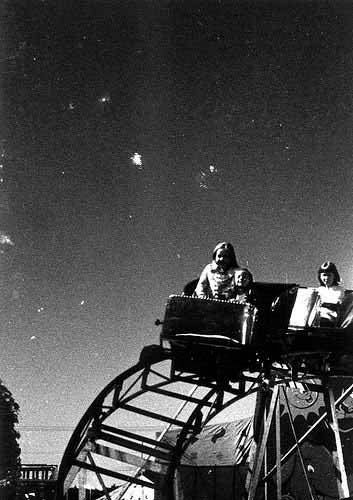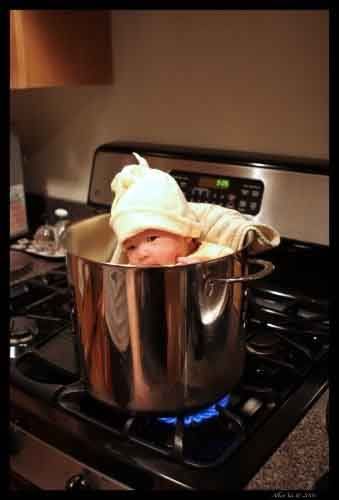 Have you ever wondered what makes us laugh? What is it about comedy that makes us feel amused? I have asked myself and Google these questions and I have some interesting answers.
Have you ever wondered what makes us laugh? What is it about comedy that makes us feel amused? I have asked myself and Google these questions and I have some interesting answers.
First off letŌĆÖs define humor. At the time of this writing, wikipedia says this about humor: ŌĆ£Humor is the ability or quality of people, objects, or situations to evoke feelings of amusement in other people.ŌĆØ This doesnŌĆÖt tell us what triggers the feelings of amusement. I have noticed that all jokes, puns and riddles have one thing in common; they all poke at some kind of pain. Everything thing that makes us laugh involves a painful act whether it be physical, emotional or mental. The more pain stacked up, the funnier it is - to a point. If it goes too
far, the comedy becomes a tragedy.
Good jokes are painful on many levels. All jokes are basically painful because after the punchline, the audience says in their head “I can’t believe I didn’t see that coming,” and laughs. A joke is a mental surprise. When a magician produces a bird, is it “magic” if the audience sees the bird coming? If the audience didn’t see it coming and is surprised, how is this different from a joke? If they saw it coming, the magician was not very good and no magic was performed.
- ŌĆ£What do you say when someone takes your cheese? Leave my provolone.ŌĆØ This is a pun. The first pain is the threat of theft; which is weak at that. (Who steals cheese?) “Provolone” can be taken two ways and calls to the pain of being confused. Because this pun has weak pains it is not very funny; puns are often considered the lowest form of comedy. Puns used with other pains create funnier moments.
- ŌĆ£How many dull people does it take to change a light bulb? One.ŌĆØ This joke evokes an emotional pain.
- ŌĆ£So a guy walks into a bar with a rabbi, a priest, a Buddhist and a duck. The bartender looks at the group and says, ŌĆśWhat’s this, a joke?ŌĆÖŌĆØ The pain here is that people are use to and are bored with the racial/political/religious setup. They were also not expecting the outcome and it is always painful when it is obvious that someone’s perception has been disordered.
Jokes are also offered in conversation to show wit: or to “show off” one’s wit. To “show off” means that one person can do something better than another. When it comes to showing off wit, you are showing off mental skills; just like magic. This pain leaves the spectator to think, in no specific terms, “you got me on that one.” If they had to think about it, it is funnier because, on a ego level, it shows mental stupidity either on the joke tellers part or the spectators.
 In the Psychology of Laughter, chapter 19, Boris Sidis writes, ŌĆ£When a mental process, instead of attaining its aim, suggests the reverse inference of what has been intended, the laugh is raised by the failure and by the mental stupidity of the person.ŌĆØ (Very harsh words but worth a second read.) What else makes us laugh? How about roller coasters. I laugh very hard riding those and the only thing they do is throw me around at high rates of speed. It is somewhat stupid to put myself in that situation because if something goes wrong, it would be disastrous. Riding roller coasters is a form of humor. So is magic.
In the Psychology of Laughter, chapter 19, Boris Sidis writes, ŌĆ£When a mental process, instead of attaining its aim, suggests the reverse inference of what has been intended, the laugh is raised by the failure and by the mental stupidity of the person.ŌĆØ (Very harsh words but worth a second read.) What else makes us laugh? How about roller coasters. I laugh very hard riding those and the only thing they do is throw me around at high rates of speed. It is somewhat stupid to put myself in that situation because if something goes wrong, it would be disastrous. Riding roller coasters is a form of humor. So is magic.
With a magic effect, we magicians metaphorically drive an audience down a road and when the audience thinks they know where they are going, we turn them into a tree. Tada! Hows that for pain? What a joke does audibly, magic does visually. Magic creates confusion and disorder and if done with skill, can create dilemmas and sight gags just like jokes and puns. Sometimes people laugh at the result of good tricks, even when there is no ŌĆ£funnyŌĆØ business. People also express their amusement with screams of delight and applause. They laugh at the confusion in their heads created by the magical effect.
I live in an entertainment heavy town. One of my friends here is, in my opinion, the best comedian here. He has been running and staring in one of the most successful shows in town for about 20 years now. He often gets me and a few like-mined friends together to brainstorm. We brainstorm the psychological tricks in everything - not just comedy and magic. His show reflects that he thinks like a magician; but he performs comedy and song.
 I have always thought that good comedians think just like good magicians. Maybe itŌĆÖs the other way around. Watching a bad magician is like hearing a comedian with bad timing performing hack material. There is a connection between magic and comedy and I hope you see it now. If the topic comes up, let people know that magic is an expression of humor. And so are roller coasters!
I have always thought that good comedians think just like good magicians. Maybe itŌĆÖs the other way around. Watching a bad magician is like hearing a comedian with bad timing performing hack material. There is a connection between magic and comedy and I hope you see it now. If the topic comes up, let people know that magic is an expression of humor. And so are roller coasters!
Related Links: